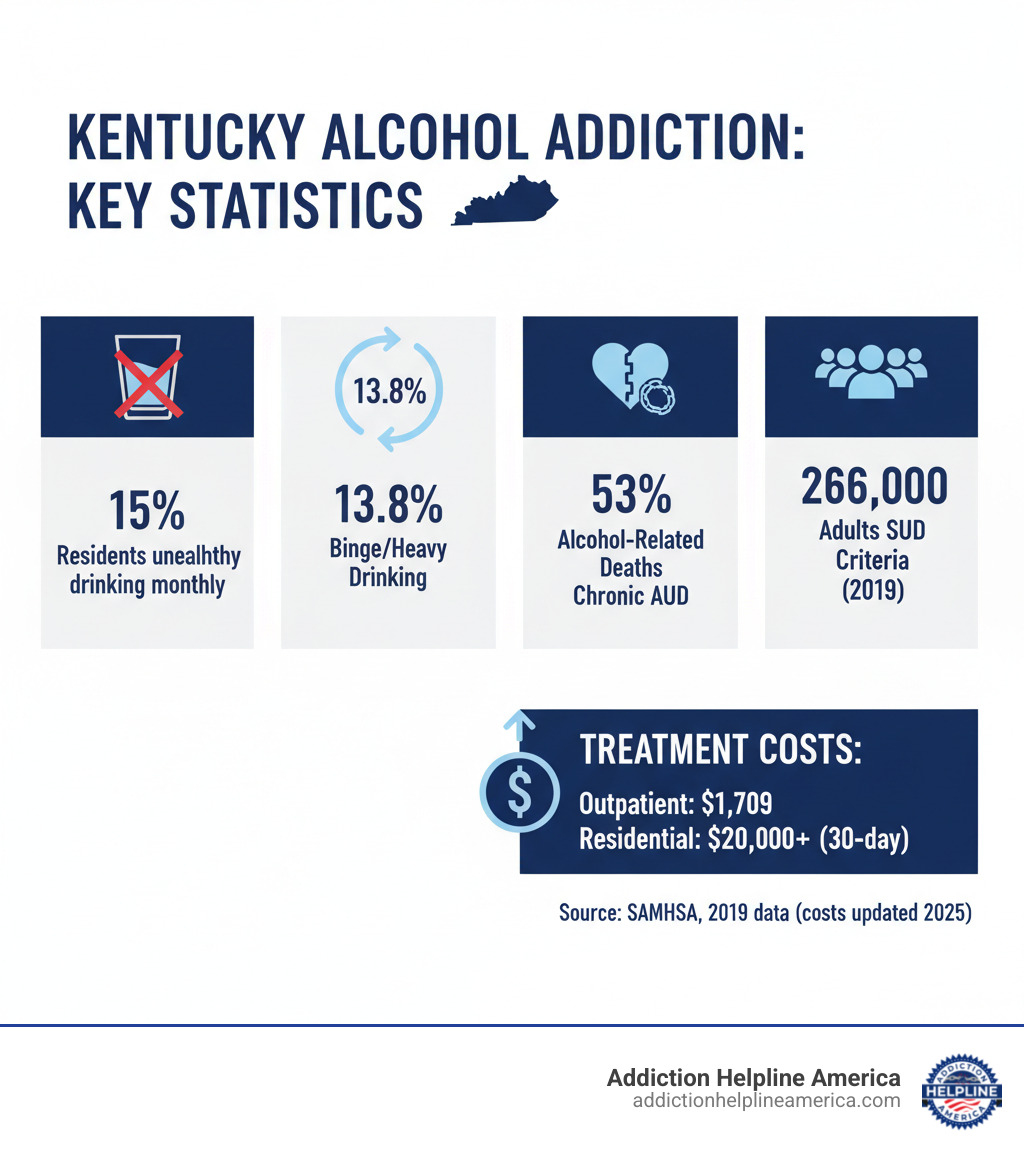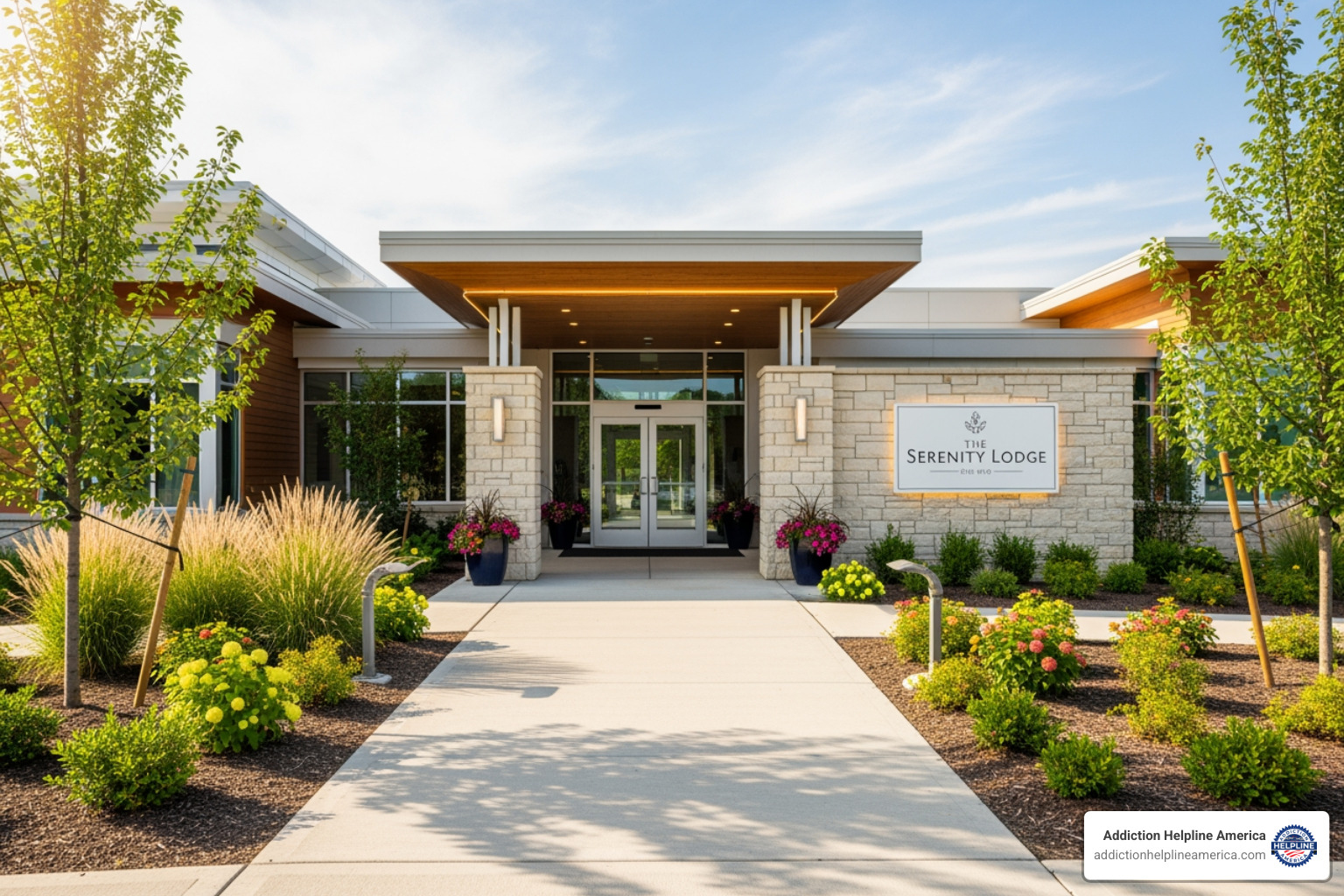
Understanding Your Options for Recovery in Kentucky
Kentucky alcohol rehab provides a full continuum of care for individuals struggling with alcohol addiction. With over 15% of residents reporting unhealthy drinking behaviors and alcohol-induced deaths on the rise, accessing treatment is critical. Fortunately, recovery is possible with the right support.
Key Treatment Options in Kentucky:
- Medical Detox: Medically supervised withdrawal management (5+ days).
- Inpatient/Residential Rehab: Structured, 24/7 care in a facility (30-90 days).
- Outpatient Programs: Flexible treatment (IOP, PHP) while living at home.
- Medication-Assisted Treatment (MAT): FDA-approved medications and counseling.
- Dual Diagnosis Care: Integrated treatment for addiction and mental health conditions.
Cost and Coverage:
- Costs range from an average of $1,709 for outpatient to over $20,000 for 30-day residential care.
- Most major insurance plans (Aetna, Cigna, Humana, Medicaid, Medicare) are accepted.
- State-funded and sliding-scale options are also available.
If you’re struggling with cravings or withdrawal symptoms, professional help is available. Kentucky has 523 substance abuse treatment facilities offering everything from detox to long-term aftercare.
Addiction Helpline America specializes in connecting you with a Kentucky alcohol rehab program that fits your unique needs. Our team offers confidential, compassionate guidance 24/7 to help you steer your options.
Understanding Alcohol Addiction in the Bluegrass State
Alcohol addiction, or Alcohol Use Disorder (AUD), is a chronic condition that impacts both body and mind. It creates a physical dependence, where the body needs alcohol to feel normal, and a psychological impact, where an emotional compulsion to drink persists despite negative consequences. According to SAMHSA’s data, nearly 40% of clients in Kentucky treatment facilities in 2019 were there for issues involving alcohol, highlighting the essential role of Kentucky alcohol rehab services.
Recognizing the Signs of Alcohol Addiction
Spotting the warning signs of AUD is the first step toward recovery. Key indicators include:
- Increased tolerance: Needing more alcohol to achieve the desired effect.
- Secretive behavior: Drinking alone or hiding the amount of alcohol consumed.
- Neglecting responsibilities: Failing to meet work, school, or family obligations.
- Failed attempts to quit: Trying to stop or cut back on drinking without success.
- Intense cravings: A persistent and overwhelming urge to drink.
- Relationship problems: Continuing to drink despite causing conflict with loved ones.
- Ignoring consequences: Drinking even after it has led to health, legal, or financial problems.
If these signs are familiar, professional help is available.
The Scope of Alcohol Use in Kentucky: Key Statistics
Statistics highlight the urgent need for effective treatment in Kentucky. Over 15% of residents reported unhealthy drinking behaviors monthly, and 13.8% engaged in binge or heavy drinking in a 30-day period. Alarmingly, over 53% of alcohol-related deaths are linked to chronic AUD. In 2019, an estimated 266,000 adults in Kentucky met the criteria for a substance use disorder, underscoring the critical need for accessible Kentucky alcohol rehab programs.
The Dangers of Alcohol Withdrawal
Stopping alcohol abruptly after developing a physical dependence can be life-threatening. That’s why medically supervised detox is a crucial first step in Kentucky alcohol rehab. While some experience milder withdrawal symptoms like tremors, anxiety, nausea, and sweating, others can face a medical emergency.
Severe symptoms include seizures, hallucinations, and Delirium Tremens (DTs)—a dangerous condition involving confusion, high blood pressure, and fever. These complications can be fatal without medical intervention. Attempting to detox at home is extremely risky; a professional detox facility provides 24/7 monitoring and medication to ensure your safety during this critical phase.
A Comprehensive Guide to Kentucky Alcohol Rehab Programs
Recovery from alcohol addiction is a personal journey, not a one-size-fits-all process. Kentucky alcohol rehab centers offer a continuum of care with a wide range of evidence-based treatment options to meet you where you are. The goal is to find personalized care that addresses your unique challenges and goals.
At Addiction Helpline America, we specialize in helping people steer these choices with clarity, connecting you with programs that truly match your needs.
Levels of Care for Alcohol Addiction
Addiction treatment is structured in levels, allowing you to move to less intensive care as you progress. Understanding these levels helps you make an informed decision. You can learn more about treatment levels of care to see which might be right for you.
| Level of Care | Description | Typical Duration | Features |
|---|---|---|---|
| Medical Detoxification | 24/7 medically supervised withdrawal management | 5-7 days | Around-the-clock monitoring, medication management, safe environment |
| Inpatient/Residential Treatment | Live at facility with intensive daily programming | 30-90 days | Structured schedule, individual and group therapy, removed from triggers |
| Partial Hospitalization Program (PHP) | Intensive treatment while living at home | Several weeks to months | 5-7 days/week programming, medical monitoring, return home evenings |
| Intensive Outpatient Program (IOP) | Structured therapy with increased flexibility | 8-12 weeks | 3-5 days/week sessions, maintain work/family commitments |
| Standard Outpatient Care | Regular counseling sessions while living independently | Ongoing | 1-2 sessions weekly, maximum flexibility, continued support |
Specialized Treatment Approaches in Kentucky
Effective Kentucky alcohol rehab programs also offer specialized approaches to treat the whole person:
- Dual Diagnosis Treatment: Simultaneously treats alcohol addiction and co-occurring mental health conditions like depression or anxiety for better outcomes.
- Holistic Therapies: Complements traditional therapy with practices like yoga, nutrition counseling, and mindfulness to heal the mind, body, and spirit.
- Medication-Assisted Treatment (MAT): Uses FDA-approved medications (e.g., naltrexone) alongside counseling to reduce cravings and support recovery.
- 12-Step Facilitation: Introduces the principles of peer support programs like Alcoholics Anonymous (AA) to build a community for long-term sobriety.
You can learn more about specialized treatment options to find a program with the approaches that resonate with you.
A Comprehensive Guide to Kentucky Alcohol Rehab Programs
Recovery from alcohol addiction is not a straight path, which is why Kentucky alcohol rehab centers offer a wide range of treatment options, from medical detox to aftercare support. This continuum of care allows you to enter treatment at the level that matches your needs and progress through different phases as you grow stronger.
Whether in Lexington, Louisville, or a smaller community, programs are designed to guide you toward lasting sobriety with personalized, evidence-based therapies.
Levels of Care for Alcohol Addiction
Choosing the right level of care is a critical decision. At Addiction Helpline America, we help individuals steer these choices daily. For a deeper dive, you can learn more about treatment levels of care.
| Level of Care | Description | Typical Duration | Key Features |
|---|---|---|---|
| Medical Detoxification | Medically supervised withdrawal management to safely rid the body of alcohol. Often includes medication to ease symptoms and prevent complications. | 5+ days | 24/7 medical supervision, medication management, safe environment |
| Inpatient/Residential Treatment | Clients live at the facility for intensive, structured therapy and support. Provides a distraction-free environment focused entirely on recovery. | 30-90 days or more | Individual and group therapy, structured daily schedule, peer support, round-the-clock care |
| Partial Hospitalization Program (PHP) | Offers intensive daily treatment during the day, similar to inpatient care, but clients return home or to a sober living facility at night. | Up to 30 days | Structured therapy, medical monitoring, more flexibility than inpatient |
| Intensive Outpatient Program (IOP) | Provides structured therapy for several hours a day, a few days a week. Allows clients to maintain work, school, or family commitments. | 60+ days | Group and individual counseling, life skills development, greater independence |
| Standard Outpatient Care | Less intensive, with regular therapy sessions typically once or twice a week. Suitable for individuals with strong support systems or as a step-down from more intensive programs. | Varies | Individual counseling, ongoing support, focus on relapse prevention |
Specialized Treatment Approaches in Kentucky
Beyond the level of care, the best Kentucky alcohol rehab programs offer specialized approaches for individual needs. To explore the full range of options, you can learn more about specialized treatment options.
- Dual Diagnosis Treatment: Essential for those with co-occurring mental health conditions like depression or anxiety. Integrated treatment addresses both issues simultaneously, dramatically improving the chances of lasting recovery.
- Holistic Therapies: Practices like yoga, nutrition counseling, and mindfulness complement traditional therapy by supporting your physical, emotional, and spiritual well-being.
- Medication-Assisted Treatment (MAT): Combines FDA-approved medications with counseling. Medications like naltrexone can reduce cravings, helping your brain heal while you learn new coping skills.
- 12-Step Facilitation: Integrates the principles of peer support groups like Alcoholics Anonymous into treatment, helping you build a strong community for long-term recovery.
Taking the First Step: How to Access Treatment
Deciding to seek help for alcohol addiction is a courageous first step. Understanding the next part—admissions, payment, and finding a facility—can feel overwhelming. We are here to make the path to Kentucky alcohol rehab as clear and stress-free as possible.
The Admissions Process: What to Expect
The admissions process is designed to be supportive. While each facility varies, most follow these steps:
- Initial Confidential Call: Your first contact to ask questions and share your situation with a service like Addiction Helpline America or a treatment center.
- Free Addiction Assessment: A professional evaluation of your substance use history and health to determine the appropriate level of care.
- Insurance and Financial Planning: Verifying your insurance benefits and exploring payment plans or other financial resources to remove barriers to treatment.
- Personalized Treatment Plan: Creating a custom plan with therapies and goals custom to your needs.
- Admission: Starting your recovery journey, with some centers offering same-day admission.
For a comprehensive overview, you can learn about the admissions process.
Paying for Alcohol Rehab in Kentucky
Cost is a common concern, but treatment is more accessible than many realize. While residential rehab can cost $12,000-$20,000+ for 30 days, most people have coverage.
- Private Insurance: Most Kentucky alcohol rehab centers accept major providers like Aetna, Blue Cross Blue Shield, Cigna, Humana, and United Behavioral Health/Optum.
- Government Insurance: Medicaid and Medicare are widely accepted, making treatment accessible.
- Uninsured/Underinsured Options: Kentucky offers state-funded programs and treatment vouchers (e.g., Operation UNITE) for those with limited financial resources.
We can help you verify benefits and explore all payment avenues. Learn more about payment options.
Finding a Kentucky alcohol rehab center
Several resources can help you find the right Kentucky alcohol rehab center:
- Online Directories: Use SAMHSA’s find a Treatment Center locator or our tool to find Kentucky rehab centers.
- State Hotlines: The KY HELP Statewide Call Center (1-877-318-1871) and KY-OAR Hotline (1-800-854-6813) offer referrals.
- Operation UNITE: Call their Help Line at 1-866-90-UNITE for guidance and information on treatment vouchers.
- KSP Angel Initiative: Visit any Kentucky State Police Post for compassionate, non-judgmental help connecting to treatment. Learn more at the KSP Angel Initiative website.
- Local Resources: For the Lexington area, visit gethelplex.org.
Life After Rehab: Building a Foundation for Lasting Sobriety
Completing a Kentucky alcohol rehab program is the beginning of a lifelong recovery journey. Lasting sobriety is built on continued effort, effective relapse prevention, and a strong support system. Aftercare provides the essential bridge between the structured environment of rehab and the challenges of daily life.
Aftercare and Continued Support
Essential aftercare services help sustain recovery by applying what you learned in treatment to real life:
- Sober Living Homes: These offer a structured, supportive residential environment where you can practice sober living skills while working or attending school.
- Alumni Programs: Maintained by many rehab centers, these programs create a community for former residents to share support and celebrate milestones.
- Ongoing Therapy: Individual and group therapy sessions help you continue developing coping skills and process life’s challenges in a safe space.
- Peer Support Specialists: Individuals in recovery who use their lived experience to mentor and guide others.
- Support Groups: Regular participation in groups like Alcoholics Anonymous (AA) provides peer connection and accountability. Operation UNITE offers information on After-Care Support Groups.
Community and State Recovery Resources
Kentucky provides a strong network of resources to support long-term recovery by addressing practical challenges:
- Recovery Kentucky Program: A state initiative providing housing and recovery services for those in recovery, particularly those experiencing homelessness. Learn more about the Recovery Kentucky program.
- Kentucky Drug Court: Offers a rehabilitative path combining judicial oversight with treatment, focusing on recovery over incarceration.
- UNSHAME Kentucky Campaign: A statewide initiative to reduce the stigma of addiction by sharing recovery stories and educating communities. Visit UNSHAME Kentucky to learn more.
- Local Support Meetings: Groups like Alcoholics Anonymous (AA) and SMART Recovery offer free, peer-led support throughout the state, forming the backbone of long-term recovery for many.
Frequently Asked Questions about Kentucky Alcohol Rehab
How long does a typical Kentucky alcohol rehab program last?
The duration of a Kentucky alcohol rehab program is personalized based on your unique needs, the severity of your addiction, and your progress. Common timeframes include:
- 30-day programs: Offer an intensive foundation for recovery, ideal for those with less severe addiction or strong home support.
- 60-day programs: Allow for deeper therapeutic work and more time to practice new coping skills.
- 90-day programs: Often recommended for long-standing addiction, as research shows longer treatment improves long-term outcomes.
Your treatment team will conduct an assessment to recommend the right duration for you, which may also include extended care options like sober living.
What is dual diagnosis treatment and why is it important?
Dual diagnosis treatment is an integrated approach for individuals who have both a substance use disorder and a co-occurring mental health condition, such as depression, anxiety, or PTSD. Since these conditions often fuel each other in a vicious cycle, treating them simultaneously is crucial for lasting recovery.
This approach addresses the underlying causes of addiction, leading to improved recovery outcomes and a stronger foundation for sobriety. Many Kentucky alcohol rehab facilities specialize in this comprehensive care because true healing addresses the whole person. To explore if this is right for you, you can learn more about dual diagnosis.
How can I find free or low-cost alcohol rehab in Kentucky?
Cost should not be a barrier to recovery. Kentucky offers several options for affordable Kentucky alcohol rehab services:
- State-funded facilities: Provide treatment at reduced or no cost for low-income individuals.
- Medicaid: Many rehab centers accept Medicaid, which can cover most or all of your treatment costs.
- Sliding scale fees: Non-profit and community-based centers often adjust their prices based on your ability to pay.
- Treatment vouchers: Programs like the UNITE Treatment Voucher offer direct financial assistance for residential treatment in certain counties.
- KSP Angel Initiative: Connects individuals to treatment resources, including options for those facing financial barriers.
Addiction Helpline America can help you explore these options and find a program that fits your budget. Our service is free and confidential.
Conclusion: Your Path to Recovery Starts Today
Acknowledging the need for change is a courageous first step. Recovery from alcohol addiction is not just possible—it’s a reality for thousands. This guide has outlined the many Kentucky alcohol rehab options available, from medical detox and residential care to specialized treatments and aftercare.
Navigating these choices can feel overwhelming, but you don’t have to do it alone.
Addiction Helpline America provides free, confidential, 24/7 guidance to connect you with the right program for your unique situation. We can help you verify insurance, explore financial options, and find a facility that offers the care you need, whether it’s outpatient, inpatient, or dual diagnosis treatment.
Seeking professional help is an act of strength. Your future is worth fighting for, and Kentucky’s network of treatment centers is ready to support you. When you’re ready, we’ll be here to help you take the next step.
Our helpline is 100%
free & confidential
If you or someone you care about is struggling with drug or alcohol addiction, we can help you explore your recovery options. Don’t face this challenge alone—seek support from us.
Programs
Resources
Will my insurance
cover addiction
treatment?
We're ready to help
Find the best
drug or alcohol treatment
center
Are you or a loved one struggling with addiction? Call today to speak to a treatment expert.
















